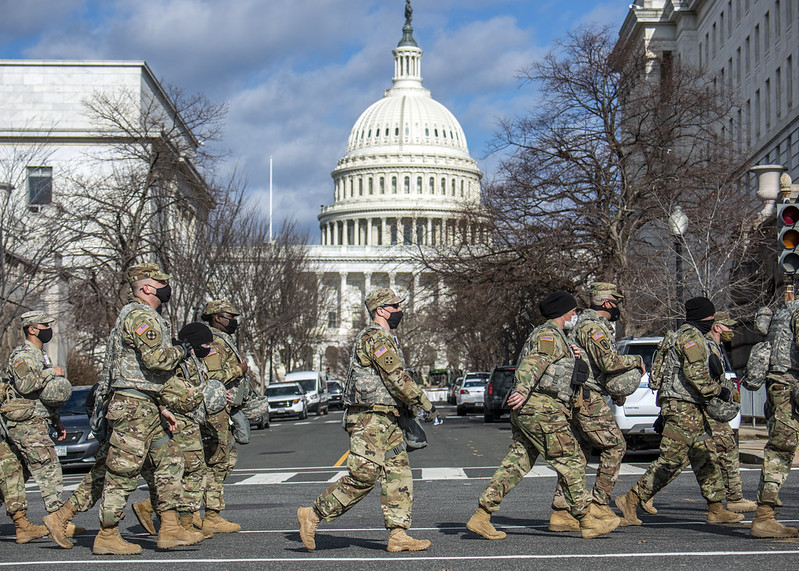Have you ever been to a war zone? I haven’t. I’ve been in dicey neighborhoods during violent events, I’ve been detained at checkpoints, I’ve had a gun held to my heart, and the car I was in was once nearly overturned by an angry mob at the Polish-Ukrainian border, but an actual war zone? No way.
As you can see, I don’t know anything about war zones. All I know is that even when swarmed with the National Guard, Washington D.C. certainly hasn’t looked like one, in spite of multiple, sometimes hysterical claims to the contrary. It doesn’t even rise to the level of danger of that unfortunate border incident I experienced as a kid.
I’ve long admired C.J. Chivers’ description of war as a series of “state-sanctioned crimes.” We don’t often want to think about it this way, and certainly not when it comes to fighting, say, Nazis, but Chris has always had a point. War ruptures the fabric of life. A heavy security presence following a breach of the Capitol is certainly a disturbance, but that doesn’t mean we’re in armed conflict with ourselves.
I don’t often like to say this, mainly because it makes me sound like an arrogant jerk, but far too many Americans are soft and unsure of themselves. Our belligerent gun displays, for example, are in many ways a symptom of this softness. And softness is a state of being engendered by privilege. People who cosplay at being tough do so because, underneath all of their bullshit, they worry that they couldn’t hack it in a dangerous situation.
You may think I’m only criticizing conservatives here, but the truth is, liberals have their own distorted views on safety and security. Since the Jan 6th attack, and since the National Guard descended on D.C., I keep hearing from them about how the U.S. is a “failed state.” Excuse me, but what the fuck? Do these people even know what a failed state looks like?
Again, only an enormous buffer of privilege could inspire someone to look at the proceedings around our current transfer of power and declare that the government is no longer in control.
Privilege is somewhat of a tiresome word, of course, because it’s meant to invoke guilt. I don’t want people who are mistaken about what’s going on to feel guilty. I don’t think that guilt is generally productive.
What I want, instead, is a reality check.
We already have a lot of people in this country who are suffering from a mass delusion. Look no further than the QAnon folks, who are utterly convinced that lawfully elected Joe Biden can’t be president. The thing about delusion is that it can mutate and become contagious. The hysteria of QAnon ripples outward and our responses, such as all of the “war” nonsense and the “failed state” nonsense can be similarly hysterical.
This is not a productive way of being. Hysteria can score you points on social media — and there’s plenty to be said about the destructive influence of social media on our society as a whole here — but, much like that idiotic selfie on Capitol grounds that leads to the FBI swooping down on your house, it ultimately won’t get you very far.
If we’re going to develop healthy and *helpful* coping mechanisms for political turmoil, we have to stop living in a self-fulfilling prophecy. We have to remember that words mean things. We must understand that temporary inconveniences such as security measures are a sign of government functioning normally. We too have to start functioning normally or, at the very least, strive for as much.
And that’s my take on the mental state of our country as Biden takes office.
Image credit: SC National Guard

